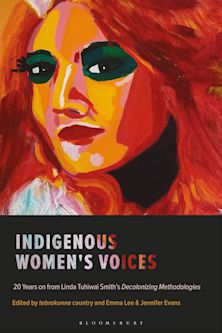- Home
- ACADEMIC
- International Development
- Society, Culture and Development
- Longitudinal Qualitative Research
This product is usually dispatched within 2-4 weeks
- Delivery and returns info
-
Flat rate of $10.00 for shipping anywhere in Australia
Inspection copy added to basket
This title is available for inspection copy requests.
Please note our inspection copies are only available in ebook format, and are fulfilled by VitalSource™. If an ebook isn’t available, please visit our inspection copy page for more information.
You must sign in to add this item to your wishlist. Please sign in or create an account
Description
Johnny Salda-a outlines the basic elements of longitudinal qualitative data, focusing on micro-levels of change observed within individual cases and groups of participants. He draws upon his primary experience in theater education to examine time and change in longitudinal qualitative studies; contending that 'playwrights and qualitative researchers write for the same purpose: to create a unique, insightful, and engaging text about the human condition.' Offering sixteen specific questions through which researchers may approach the analysis of longitudinal qualitative data, Professor Salda-a presents a text intended as a primer for fellow newcomers to long term inquiry, based on traditional social science methods from traditional qualitative and quantitative paradigms, but enriched by an artist-educator's unconventional perspective.
Table of Contents
Chapter 2 Introduction: Looking Toward the Journey
Chapter 3 Chapter 1: Longitudinal Qualitative Studies, Time, and Change
Chapter 4 Chapter 2: Longitudinal Qualitative Research Design
Chapter 5 Chapter 3: Longitudinal Qualitative Data Analysis
Chapter 6 Chapter 4: Framing Questions
Chapter 7 Chapter 5: Descriptive Questions
Chapter 8 Chapter 6: Analytic and Interpretive Questions
Chapter 9 Conclusion: Looking Back at the Journey
Chapter 10 References
Chapter 11 Footnotes
12 Appendix: Longitudinal Qualitative Data Summary
13 Index
Product details
| Published | 13 May 2003 |
|---|---|
| Format | Paperback |
| Edition | 1st |
| Extent | 212 |
| ISBN | 9780759102965 |
| Imprint | AltaMira Press |
| Dimensions | 229 x 147 mm |
| Publisher | Bloomsbury Publishing |
About the contributors
Reviews
-
Professor Saldaña's Longitudinal Qualitative Research explores the depth of information possible in longitudinal research as well as the potential pitfalls associated with these types of studies. It is a thoughtful book for those engaged in qualitative research.
Anna V. Wilson, North Carolina State University
-
Johnny Saldaña is one of the most creative minds working in qualitative research today. Here he offers an important option to qualitative researchers, explained in a fresh, interesting way. Using examples from a background combining theatre and educational research, he shows how to approach long-term studies, what kinds of questions can be addressed that shorter research projects cannot, and how the passage of time affects how we research and what we learn.
Harry F. Wolcott, University of Oregon; (d. 2012)
-
This book is welcomed addition to the books on qualitative analysis, none of which to this time have given the in-depth attention to process that Saldaña has. The book not only makes the case for process but gives clear strategies for how to bring process into analysis. This will be a great aid to students of qualitative analysis.
Juliet M. Corbin, Forum: Qualitative Social Research
-
I think [his] book on qualitative research-longitudinal or just 'commonplace' is GREAT. . . .There are so many excellent references, descriptions and discussions for texts, support books, articles, journals, monographs, etc. in [his] book, that any doctoral student preparing to do a dissertation could benefit from, I feel [his] book-wheteher someone is doing longitudinal qualitative research or not, is a valuable offering and should be read by qualitative researchers, even if they are not contemplating longitudinal research.
Edith King, University of Denver
-
There is much [in the book] for an advanced researcher: in particular, how to think of and track change. . . . This volume is trying to bring rigor to a method that was somewhat ad hoc, whose details had not been previously spelled out. The steps Saldana provides us with to do this kind of work go beyond longitudinal research. Indeed, they are both handy and abstract anough to be worth considering by many of us doing a broad range of different forms of qualitative research.
Janet Salaff, University of Toronto, Field Methods
-
This book discusses approaches for seeking, identifying, and describing the qualitative dynamics of the processes associated with change over time. It has a conceptual depth based on new thinking as well as unique views of some traditional thinking about longitudinal studies. Saldaña provides an exceptionally broad and inclusive structural framework for thinking about what to initially expect in various types of qualitative longitudinal studies and how to gather the information that informs your expectations. Scholars (qualitative as well as quantitative) will find this to be a valuable book.
Richard Hofmann, Miami University



































